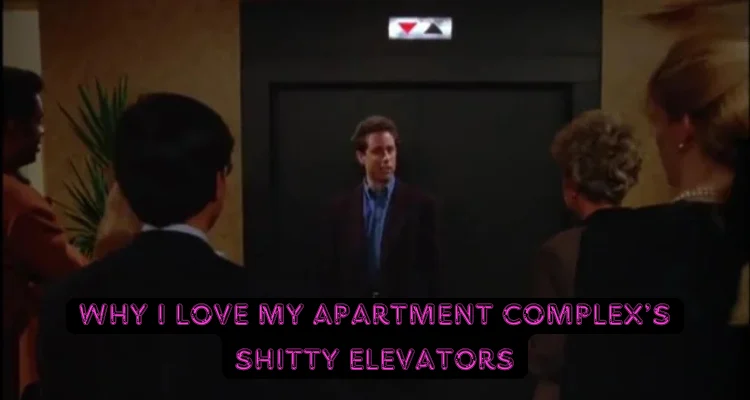The elevators in my apartment building are garbage. Technically, they work—you scan your little key fob and, eventually, they take you where you need to go. But it rarely happens on the first try. Sometimes you scan and nothing happens. You wait. Scan again. Still nothing. Maybe you wave it around like a magic wand. Maybe the person next to you gives it a go, and theirs doesn’t work either. Eventually, the light flashes, the doors close, and you ascend.
It’s annoying. Everyone agrees. It’s one of those quiet, shared frustrations that comes with modern city living. But what’s strange is: I’ve grown to love it.
Not because I enjoy being delayed or because I have some masochistic relationship with broken technology. I love it because it breaks the script. The dysfunction, the slight failure of the system, opens up a gap—an opportunity. A chance to say, “Yeah, these elevators always give me trouble too,” and to hear someone laugh and say, “Right?” It’s a tiny moment of connection. A shared experience born not from perfection, but from a glitch.
This might sound trivial. But in a world increasingly engineered for smooth, frictionless, anonymous functionality, these little points of failure—the interruptions in the system—are where life leaks in. Where we are reminded of each other’s presence. And more than that: they expose something deeper. A crack in the symbolic order. A moment where the Real becomes visible.
The Ideology of Efficiency and Isolation
Modern apartment buildings, like mine, are engineered to be efficient. Swipe your fob, take your ride, don’t talk to anyone. Everything about the architecture and technology is designed to reduce friction—especially social friction. You’re not supposed to make eye contact in the lobby. You’re not supposed to say anything in the elevator. The entire experience is meant to be seamless, private, sterile.
But this seamlessness is ideological. What looks like convenience is really a structure designed to eliminate the Other—to protect us from unexpected encounters. Žižek might call this the fantasy of the decaffeinated neighbor: the Other stripped of all unpredictability, reduced to a silent background actor in your personal movie. You get the social form of a community (shared walls, shared amenities) without the messy content (actual engagement, vulnerability, contradiction).
Marx helps us here, too. Just as commodity fetishism masks the labor and social relations behind an object’s exchange value, the building’s technological smoothness masks the human network it relies on—and actively suppresses new social relations from forming. Everything works just well enough to keep you moving, isolated, and productive.
But the elevator doesn’t work perfectly. And that failure disrupts the ideological illusion.
You’re forced to pause. You notice someone next to you. Maybe you sigh. Maybe they chuckle. And now, for a brief moment, you’re no longer atomized. You’re both caught in the same system—aware of its brokenness, aware of each other. The glitch pulls back the curtain.
Because ideology doesn’t just operate in what we believe—it functions in the infrastructure of our lives. The elevator is supposed to erase friction, but in failing to do so, it gives us something ideology normally withholds: a moment of encounter.
The Dysfunction as a Breach in the Symbolic Order
You scan your fob. Nothing happens. You scan again. Still nothing. You look at the person next to you. They try. Also nothing. But in that awkward, silent moment, something flickers into view: the system that governs your daily life has broken its promise.
Lacan would call this a rupture in the symbolic order—the network of signs, protocols, and structures that gives meaning to our world. In this order, the elevator has a clear function: fob, push, ascend. It’s a closed loop. A symbolic ritual that’s supposed to reaffirm your place in the system—“I belong here, I have access, I am a subject of this building.”
But when the scan fails, the loop breaks. The building no longer recognizes you—at least not immediately. You’re temporarily suspended in symbolic limbo, caught in a gap between recognition and function. This is what Lacan refers to as a confrontation with the Real—that which resists symbolization entirely. The raw, uncomfortable space where meaning doesn’t click into place. The fob doesn’t work. You don’t know what to do. You’re not quite sure who you are in this moment.
It’s disorienting—but it’s also liberating. Because in that slippage, you’re no longer fully interpellated by the system. You’re not just “resident #403B following elevator protocol.” You’re a desiring subject, caught in a shared moment of ambiguity with another.
This is the paradox of the glitch: it doesn’t just reveal the system’s failure. It reveals you, too—your reliance on the symbolic, your vulnerability when it falters, your desire for recognition not just from the machine, but from the person beside you. The failed scan produces a moment of spontaneous subjectivity, a micro-event of Real encounter.
And maybe, if you’re both feeling bold, a comment or joke. In that moment, you’ve broken the script—and written a new one, together.
The Shared Inconvenience as a Site of Solidarity
When the elevator fails to function, something weird happens: people look up from their phones. They make eye contact. They sigh together. They laugh. They say something like, “This thing never works.”
It’s nothing, right? But it’s also everything.
In that moment, two isolated residents—two cogs in the machine of urban life—become subjects in relation to each other. Not because they should connect, or because a building-sponsored mixer told them to. But because the system glitched. Because something didn’t work. Because the ideological infrastructure temporarily collapsed—and in its place, a fragile form of human connection emerged.
Marx would recognize this: solidarity isn’t born from comfort—it’s born from shared struggle, even if that “struggle” is just two people waiting on a broken elevator. These moments aren’t revolutionary in the traditional sense, but they contain the logic of revolution: the recognition that you’re not alone, and that your frustration is not uniquely yours.
Žižek often says that ideology functions not just through belief, but through rituals—through the way we act even when we know something’s bullshit. The beauty of the shitty elevator is that it interrupts that ritual. It breaks the smooth circuit of “swipe, ascend, ignore.” It creates a pause where new action is possible.
And in that pause, there’s the potential for something rare: mutual recognition.
Maybe next time you see that person in the lobby, you’ll nod. Maybe you’ll hold the door. Maybe a shared annoyance turns into a passing friendship. Maybe not. But the possibility is there—and it’s because of the inconvenience, not in spite of it.
The glitch creates a commons. A strange, temporary commons where people experience the same delay, the same system failure, the same minor absurdity. And in that shared absurdity, there’s room for play. For speech. For communion.
In a world engineered for isolation, maybe the shitty elevator is doing something right.
Reclaiming the Everyday Through the Revolutionary Lens
There’s a temptation to dismiss all of this—the glitch, the sigh, the shared smirk—as trivial. Just another quirk of modern living. But that dismissal is itself ideological. It’s part of the system’s defense mechanism: convincing us that only grand gestures count as real change, that the everyday is apolitical, that connection only matters when it’s monetized, posted, or optimized.
But what if the everyday is exactly where the revolution starts?
The Revolutionary doesn’t wait for the perfect conditions to act. They don’t retreat into fantasy or nihilism. They look at the world as it is—flawed, awkward, full of contradictions—and ask: Where does the structure break? Where does subjectivity emerge? Where is the system already failing to sustain itself?
In that sense, the shitty elevator is more than an inconvenience—it’s a crack in the facade. A reminder that the smooth surfaces of our lives are only held together by fragile rituals and assumed compliance. And when those rituals falter, when the system hiccups, something raw slips through.
The Lacanian Real, the Marxian contradiction, the Žižekian moment of ideological rupture—they’re not confined to books or big historical events. They’re in the hallway. By the elevator. In the pause between scans.
That’s the true terrain of the Revolutionary Artist: not just critiquing the world from a distance, but inhabiting it fully, searching for the absurd, the broken, the intimate—and finding meaning in it. Not retreating from daily life, but reclaiming it. Transforming it from the inside.
We don’t need perfect systems. We need real encounters. And sometimes, the best thing a building can give us is simply a reason to talk to each other.



